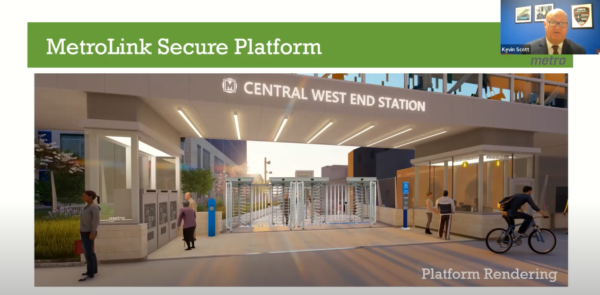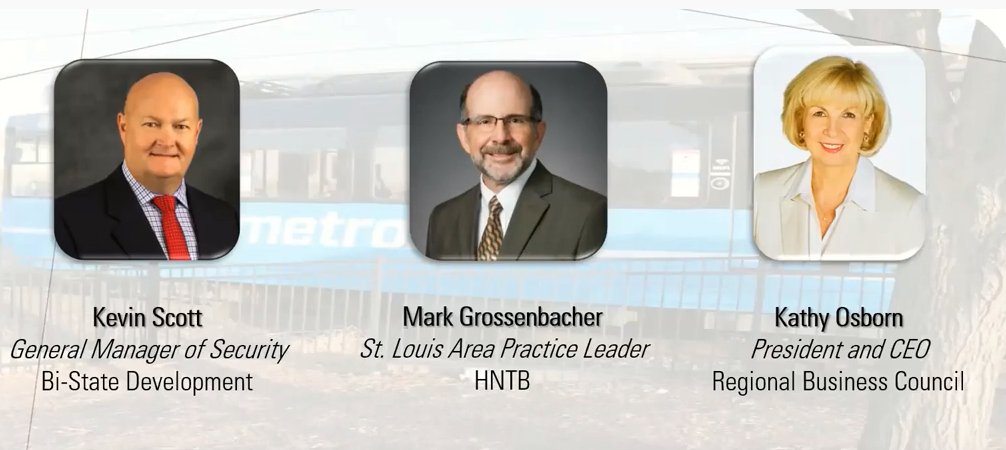Key Officials Provided Overview of Project and Timing for Next Steps
Details about the multi-tiered plan that was developed to create a more secure transit environment on MetroLink were revealed today at Citizens for Modern Transit’s (CMT) “Talking Transit” event, hosted via Zoom. Over 75 members, elected officials, stakeholders, transit riders and others were in attendance to learn more about the Secure Platform Plan (SPP) for the MetroLink system, which aims to address the security structure of Metro Transit, in part, by creating centralized, highly secure customer entrances at all 38 MetroLink stations. To view the event, click here.
Those in attendance learned about Secure Platform Plan and why this project is important to the St. Louis area business community. The panel discussion featured Kevin Scott, Bi-State Development General Manager of Security and Secure Platform Plan Project Leader; Mark Grossenbacher, St. Louis Area Practice Leader at HNTB and Project Manager on the Secure Platform Plan Project; and Kathy Osborn, President and CEO at the Regional Business Council. It was moderated by Kimberly Cella, Executive Director of Citizens for Modern Transit.
Scott kicked off the conversation by reinforcing how safety and security has been a main priority for Metro Transit since 2019 when Bi-State Development and East-West Gateway Council of Governments partnered with consultant WSP to complete a system-wide security assessment for MetroLink. This resulted in 99 recommendations for addressing security strategy, police/security staffing procedures, fare and fare enforcement, technology and crime prevention through environmental design. The majority of these recommendations have been implemented. The Secure Platform Plan will address the remaining items in the categories of fare and fare enforcement, technology and crime prevention through environmental design. The plan greatly complements what has already been put in place, positively impacting the entire system and propelling Metro Transit to the front of the transit industry.
“We recognize the community’s call for a more secure system,” said Scott. “People have always questioned why the open concept system exists on MetroLink. The Secure Platform Plan will allow us to address those concerns, enhance our overall security efforts that we’ve already made enormous progress on, and show the region – and our ridership – that we are doing everything we can to regain, rebuild and prioritize their confidence in this extraordinary regional asset.”
The $52 million Secure Platform Plan has received broad support from public and private sector partners. The sources of the $52 million in funding include $17.25 million from the Bi-State Development capital funds budget and the American Recovery Plan, $12 million Bond refinancing proceeds dedicated to security, $12 million Illinois allocation from federal stimulus and $10.75 million private sector funding. The private contributions are rare and underscore the importance of this project and the essentialness of public transit to the future of the region.
The initiative calls for new fare gates and perimeter fencing to be installed at all 38 MetroLink stations. Centralized entrances with fare gates will be created, and once installed, these will only be activated by using a valid ticket or pass. Beyond the gates, the fare purchasing system will be completely upgraded to include new ticket vending machines, card readers – featuring payment integration technology into mobile devices – and an update to the transit system’s closed-circuit camera program with a real-time camera system. There will be an increase from 800 cameras currently on the system to 1,600. All cameras will be equipped with the latest analog and digital technologies and built on a sound security platform that feeds into a real-time camera center for proactive viewing of locations. As a result, a fluid, “out-in-front-of” approach will be maintained.
Grossenbacher then addressed attendees about the project team. Transportation and design firm, HNTB has been hired for the design of this project in both Missouri and Illinois. The team features five subcontractors, including KAI Enterprises, which will provide architectural integration of the fare collection system, fencing and other aspects of the project; ABNA Engineering, Inc., which will provide topographic surveying services as required; Kivindyo Engineering Services, LLC, which will provide utility coordination services; Custom Engineering, Inc., which will provide electrical engineering and design services; and Code Consultants, Inc., which will provide code compliance, fire protection, life safety and accessibility. The project – including design, procurement and construction – is expected to be completed in 30 months.
“I cannot stress this enough,” added Scott. “This is one project with 38 different projects, one at each MetroLink station. We are very aggressively moving forward, but we want to get it right. There will likely be phased implementation.”
The event also highlighted what the Secure Platform Plan means to the business community. Kathy Osborn discussed how economic growth is rooted in access to safe, integrated access to public transportation.
“Infrastructure is very important to business,” noted Osborn. “You must be able to get people and product around. This is an economic imperative. It’s also an equity issue. So often people want the job but don’t have the transportation to get to the job. People need to feel confident in and comfortable with the public transit system.”
To view the full CMT Talking Transit Webinar, click here.
